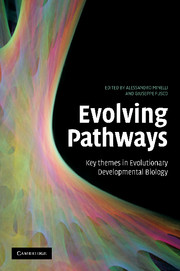Introduction: Pathways of change
Published online by Cambridge University Press: 08 August 2009
Summary
The molecular mechanisms that bring about biological form in modern-day embryos … should not be confused with the causes that led to the appearance of these forms in the first place … selection can only work on what already exists.
G. B. Müller and S. A. Newman 2003: 3The evolution of form is … descent with modification (of development).
S. B. Carroll 2005: 294–295Combining words into new formulas is an all too easy exercise. But in our case it could turn into a dangerous trick, if evolutionary developmental biology (evo-devo) does not prove to be a fruitful new adventure in science. The question is increasingly acute, as a rapidly rising number of researchers are lured by the new flag, more and more resources are put into experimental and theoretical efforts under this banner, and evo-devo is finally getting public acknowledgment in the form of dedicated university chairs, specialised journals, workshops, and the launch of new professional societies.
Over the past few years, the nature, or the identity, of evo-devo has been passionately debated. However, it would be unwise to attempt to crystallise this discipline's content in a brief formula. Taking a historical perspective, hardly any facet of contemporary science would recognise itself in what in the past would have seemed an adequate definition of a research field under the same name. Scientific disciplines change along the years. In biological parlance, one could say that scientific disciplines develop, or that they evolve.
- Type
- Chapter
- Information
- Evolving PathwaysKey Themes in Evolutionary Developmental Biology, pp. xv - xviiiPublisher: Cambridge University PressPrint publication year: 2008



